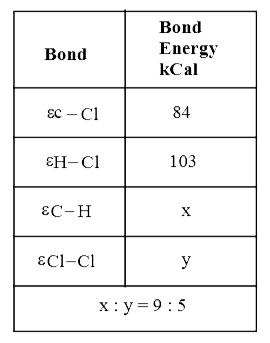Chloroform is passed from methane according to the reaction :
CH4(g)+3Cl2(g)→CHCl3(l)+3HCl(g)
Calculate ΔH for the reaction given that enthalpies of formation of HCl(g), CH4(g) and CHCl3(g) are - 92.0 ,-74.9 and -134.3kJ per mole respectively.
The correct Answer is:−335.4kJmol−1
To calculate the change in enthalpy (ΔH) for the reaction:
CH4(g)+3Cl2(g)→CHCl3(l)+3HCl(g)
we will use the enthalpies of formation (ΔHf) of the reactants and products.
1. Identify the Enthalpies of Formation:
- ΔHf for CH₄(g) = -74.9 kJ/mol
- ΔHf for HCl(g) = -92.0 kJ/mol
- ΔHf for CHCl₃(l) = -134.3 kJ/mol
- ΔHf for Cl₂(g) = 0 kJ/mol (as it is in its standard state)
2. Write the Formula for ΔH:
The change in enthalpy for the reaction can be calculated using the formula:
ΔH=∑(ΔHf of products)−∑(ΔHf of reactants)
3. Calculate the Enthalpy of Products:
- For CHCl₃(l): ΔHf = -134.3 kJ/mol
- For 3 HCl(g): 3 × ΔHf = 3 × (-92.0 kJ/mol) = -276.0 kJ/mol
- Total for products:
ΔHf (products)=−134.3+(−276.0)=−410.3 kJ/mol
4. Calculate the Enthalpy of Reactants:
- For CH₄(g): ΔHf = -74.9 kJ/mol
- For 3 Cl₂(g): 3 × ΔHf = 3 × 0 = 0 kJ/mol
- Total for reactants:
ΔHf (reactants)=−74.9+0=−74.9 kJ/mol
5. Calculate ΔH for the Reaction:
Now, substituting the values into the ΔH formula:
ΔH=ΔHf (products)−ΔHf (reactants)
ΔH=−410.3−(−74.9)=−410.3+74.9=−335.4 kJ/mol
Final Result:
ΔH=−335.4 kJ/mol
- ΔHf for CH₄(g) = -74.9 kJ/mol
- ΔHf for HCl(g) = -92.0 kJ/mol
- ΔHf for CHCl₃(l) = -134.3 kJ/mol
- ΔHf for Cl₂(g) = 0 kJ/mol (as it is in its standard state)
The change in enthalpy for the reaction can be calculated using the formula:
ΔH=∑(ΔHf of products)−∑(ΔHf of reactants)
- For CHCl₃(l): ΔHf = -134.3 kJ/mol
- For 3 HCl(g): 3 × ΔHf = 3 × (-92.0 kJ/mol) = -276.0 kJ/mol
- Total for products:
ΔHf (products)=−134.3+(−276.0)=−410.3 kJ/mol
- For CH₄(g): ΔHf = -74.9 kJ/mol
- For 3 Cl₂(g): 3 × ΔHf = 3 × 0 = 0 kJ/mol
- Total for reactants:
ΔHf (reactants)=−74.9+0=−74.9 kJ/mol
Now, substituting the values into the ΔH formula:
ΔH=ΔHf (products)−ΔHf (reactants)
ΔH=−410.3−(−74.9)=−410.3+74.9=−335.4 kJ/mol
ΔH=−335.4 kJ/mol
Topper's Solved these Questions
- THERMODYNAMICSBOOK - PRADEEPCHAPTER - THERMODYNAMICSEXERCISE - CURIOSITY QUESTIONS
4 Videos
- THERMODYNAMICSBOOK - PRADEEPCHAPTER - THERMODYNAMICSEXERCISE - ADVANCED PROBLEMS (FOR COMPETITIONS)
20 Videos
- THERMODYNAMICSBOOK - PRADEEPCHAPTER - THERMODYNAMICSEXERCISE - PROBLEMS FOR PRACTICE
14 Videos
- STRUCTURE OF ATOMBOOK - PRADEEPCHAPTER - STRUCTURE OF ATOMEXERCISE - Competition Focus (JEE (Main and Advanced)/Medical Entrance (IX. Assertion And Reason Type Questions (Type II))
12 Videos
Similar Questions
Calculate the standard enthalpy of combustion of CH4, it standard enthalpies of formation of CH4(g),H2O(l), and CO2(g) are −74.81kJmol−1,−285.83kJmol−1 and −393.51kJmol−1 respectively.
View SolutionWhat is the change in oxidation number of carbon in the following reaction?
CH4(g)+4Cl2(g)→Cl4(l)+4HCl(g)
View Solution
Knowledge Check
The reaction CH4(g)+Cl2(g)→CH3Cl(g)→HCl(g) has ΔH=−25kCal .

From the given data , what is the bond energy of Cl – Cl bondA70 kCalB80 kCalC67.75 kCalD57.75 kCalWhat is the change in oxidation number of carbon in the following reaction?
CH_4 (g) + 4Cl_2(g) rarr CCl_4(l) + 4HCl(g)A0 to +4B−4 to +4C0 to -4D+4 to +4What is the change in oxidation number of carbon in the following reaction?
CH_4 (g) + 4Cl_2(g) rarr CCl_4(l) + 4HCl(g)A0 to +4B−4 to +4C0 to -4D+4 to +4
Given
N2(g)+3H2(g)→2NH3(g),ΔrHӨ=−92.4kJmol−1
What is the standard enthalpy of formation of NH3 gas?
View SolutionN2(g)+3H2(g)→2NH3(g)ΔrH∘=−92.4kJ
What is the standard enthalpy of formation of NH3?
View SolutionCalculate the enthalpy change for the reaction
CH4(g)+2O2(g)→CO2(g)+2H2O(l)
The enethalpy of formation of CH4(g),CO2(g) and H2O(l) are -74.8 kJ mol−1, -393.5 kJ mol−1 and −285.8kJmol−1 respectively.
View SolutionThe enthalpy change (ΔH) for the reaction
N2(g)+3H2(g)→2NH3(g)
is −92.38kJ at 298K. What is ΔU at 298K?
View SolutionConsider the reaction :
SO2(g)+12O2(g)→SO3(g),ΔH=−98.3kJ
If the enthalpy of formationof SO3(g) is −395.4kJ , then the enthalpy of formation of SO92)(g) is
View Solution
